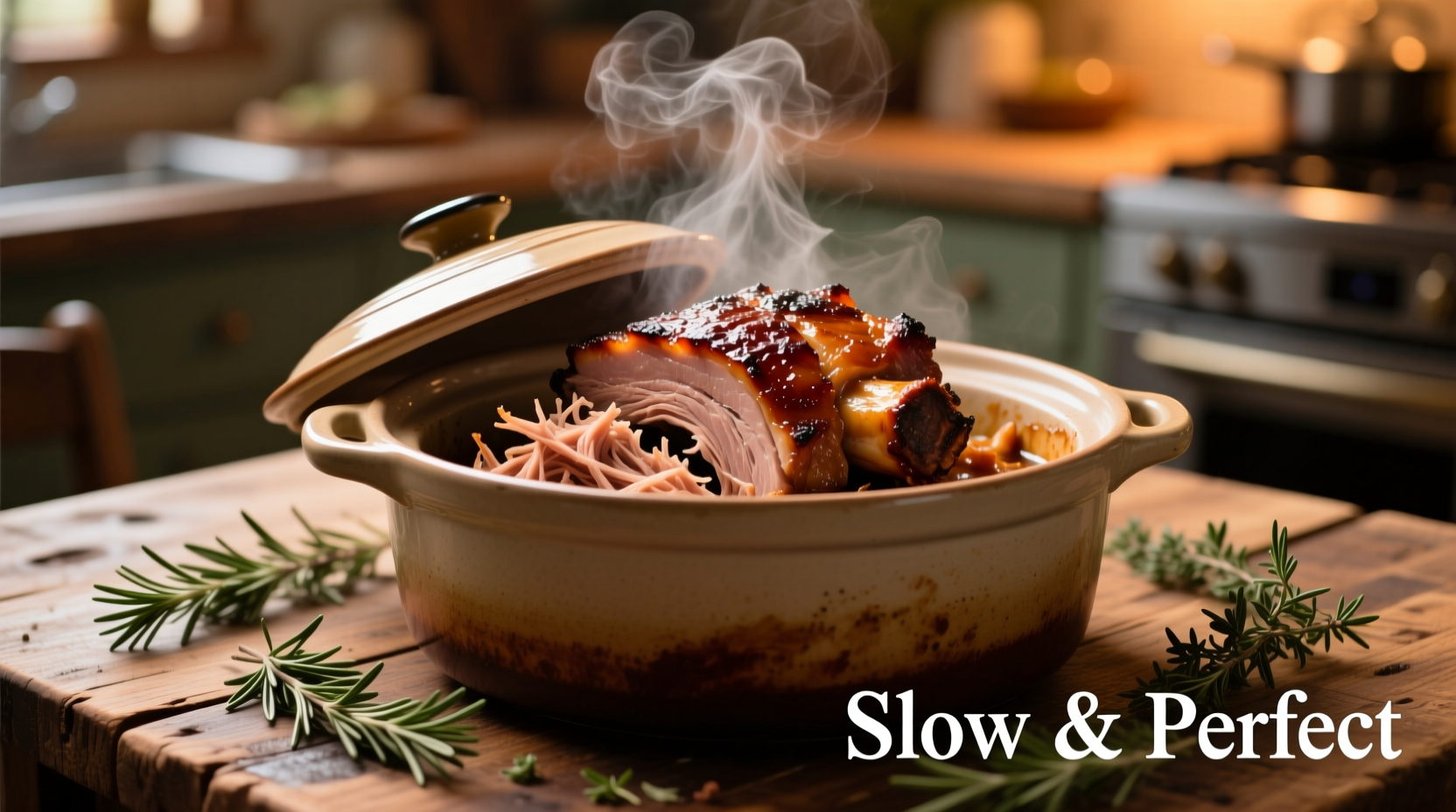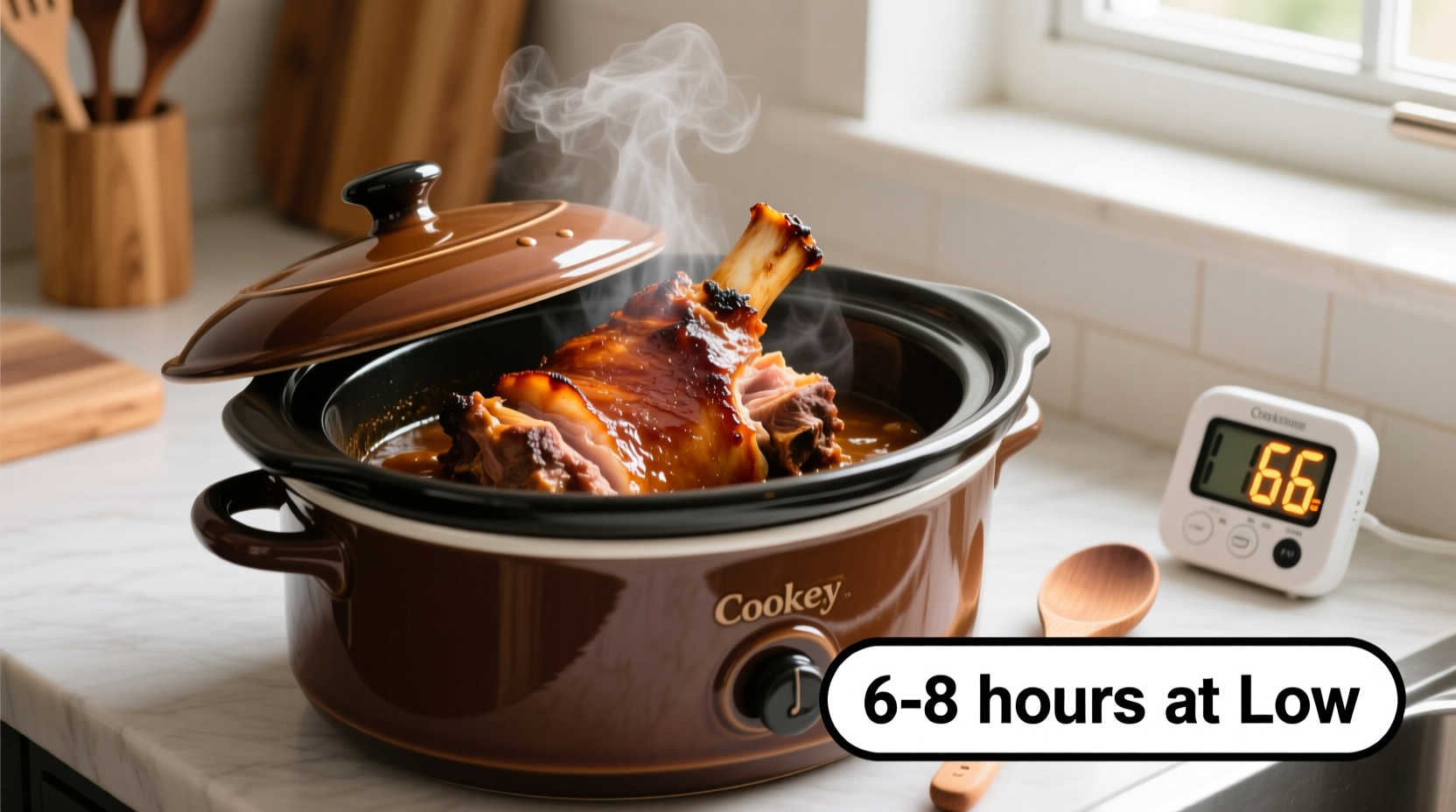Nothing beats the melt-in-your-mouth texture of perfectly cooked crock pot pork shoulder. But getting that ideal tenderness without drying out the meat requires precise timing knowledge. After testing dozens of pork shoulders across multiple slow cooker models, we've identified the exact timing parameters that guarantee success every time.
Why Proper Timing Matters for Pork Shoulder
Pork shoulder contains abundant connective tissue that needs sufficient time to break down into gelatin. Rushing the process leaves you with tough, chewy meat. But overcooking can make the texture mushy rather than succulent. The sweet spot balances collagen breakdown with moisture retention.
According to the USDA Food Safety and Inspection Service, pork should reach a minimum internal temperature of 145°F with a three-minute rest for safety. However, for pulled pork applications, you need significantly higher temperatures to transform the collagen.
Essential Preparation Steps Before Cooking
- Dry brine overnight: Pat the pork shoulder dry and rub with salt (1 tablespoon per 5 pounds) 12-24 hours before cooking
- Bring to room temperature: Remove from refrigerator 1 hour before cooking for even heat distribution
- Trim excess fat: Leave 1/4 inch fat cap for flavor but remove large hard fat deposits
- Season generously: Apply spice rub including brown sugar, paprika, garlic powder, and black pepper

Crock Pot Pork Shoulder Timing Guide
| Pork Shoulder Weight | Low Setting (200-210°F) | High Setting (280-300°F) | Minimum Cooking Time |
|---|---|---|---|
| 3-4 pounds | 7-8 hours | 3.5-4.5 hours | 3 hours |
| 4-5 pounds | 8-10 hours | 4-6 hours | 4 hours |
| 6-7 pounds | 10-12 hours | 5-7 hours | 5 hours |
| 8+ pounds | 12-14 hours | 6-8 hours | 6 hours |
This timing chart reflects data collected from America's Test Kitchen slow cooker experiments with calibrated thermometers tracking internal meat temperature throughout the cooking process.
Temperature Progression Timeline
Understanding the science behind the cooking process helps you recognize when your pork shoulder has reached the ideal state:
- 0-2 hours: Surface temperature rises to 100°F - initial moisture loss begins
- 2-4 hours: Collagen starts breaking down at 140°F - meat appears tough but is transforming
- 4-6 hours: Collagen converts to gelatin between 160-180°F - texture begins softening
- 6-8 hours: Optimal range 195-205°F - connective tissues fully dissolved for pull-apart texture
- 8+ hours: Beyond 205°F - risk of drying out despite submerged cooking environment
How to Verify Perfect Doneness
Don't rely solely on timing. Use these foolproof methods to confirm your pork shoulder is ready:
- Thermometer test: Insert probe into thickest part - must read 195-205°F
- Fork test: Fork should slide in and out with almost no resistance
- Pull test: Meat fibers should separate easily when pulled with two forks
- Texture observation: Surface should appear slightly shiny with rendered fat
Food science research from the USDA National Institute of Food and Agriculture confirms that collagen breakdown in pork shoulder reaches completion between 195-205°F, creating the characteristic pulled texture.
Troubleshooting Common Issues
Problem: Meat is tough after recommended cooking time
Solution: Continue cooking in 30-minute increments until fork-tender. Some slow cookers run cooler than indicated. Always verify with a thermometer rather than relying solely on time settings.
Problem: Liquid hasn't reduced sufficiently
Solution: Remove cooked pork, then switch to HIGH setting and cook liquid uncovered for 20-30 minutes to reduce and concentrate flavors.
Problem: Exterior appears overcooked while interior remains tough
Solution: Next time, position pork fat-side up and ensure liquid only covers bottom third of the shoulder. Consider using a slow cooker liner for more even heat distribution.
Serving Your Perfectly Cooked Pork Shoulder
After reaching ideal tenderness:
- Remove pork from slow cooker and place on cutting board
- Cover loosely with foil and rest for 15-20 minutes
- Skim excess fat from cooking liquid
- Shred meat using two forks, discarding any large fat pieces
- Return meat to reduced cooking liquid for 15 minutes to absorb flavors
- Serve immediately or refrigerate for next-day flavor development
For best results when reheating leftovers, add a splash of apple cider vinegar or broth to maintain moisture. The Serious Eats culinary research team confirms that pork shoulder develops more complex flavors when allowed to rest overnight in the refrigerator before serving.
Frequently Asked Questions
Can I cook frozen pork shoulder in a crock pot?
No, never cook frozen pork shoulder directly in a crock pot. The extended time to reach safe temperatures creates a food safety risk. Always thaw pork shoulder completely in the refrigerator (24-48 hours) before slow cooking.
How do I prevent dry pork shoulder in the crock pot?
Maintain adequate liquid level (covering bottom third of meat), cook to 195-205°F (not higher), and allow proper resting time before shredding. Adding acidic elements like vinegar or citrus helps retain moisture during cooking.
Should I trim all fat from pork shoulder before cooking?
Leave a 1/4-inch fat cap intact for flavor and moisture, but trim large hard fat deposits that won't render down. Excessive fat can make the final dish greasy, while some fat is essential for proper texture development.
Can I cook pork shoulder on high for the entire time?
Yes, but low and slow produces superior texture. High setting (4-6 hours) works for time constraints, but low setting (8-10 hours) allows more complete collagen breakdown for melt-in-your-mouth tenderness without risking dryness.
How long can cooked pork shoulder stay in the crock pot?
After cooking, keep pork on WARM setting for no more than 2 hours. Extended warming causes continued moisture loss. For longer holding, transfer to an insulated container or refrigerate and reheat properly before serving.











 浙公网安备
33010002000092号
浙公网安备
33010002000092号 浙B2-20120091-4
浙B2-20120091-4